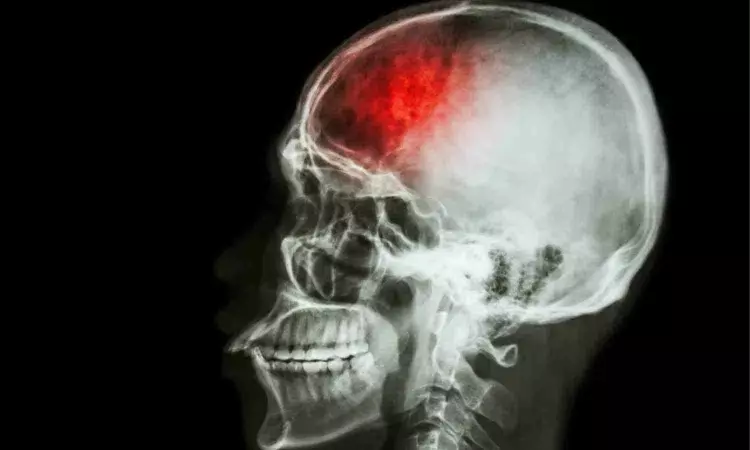- Home
- Medical news & Guidelines
- Anesthesiology
- Cardiology and CTVS
- Critical Care
- Dentistry
- Dermatology
- Diabetes and Endocrinology
- ENT
- Gastroenterology
- Medicine
- Nephrology
- Neurology
- Obstretics-Gynaecology
- Oncology
- Ophthalmology
- Orthopaedics
- Pediatrics-Neonatology
- Psychiatry
- Pulmonology
- Radiology
- Surgery
- Urology
- Laboratory Medicine
- Diet
- Nursing
- Paramedical
- Physiotherapy
- Health news
- Fact Check
- Bone Health Fact Check
- Brain Health Fact Check
- Cancer Related Fact Check
- Child Care Fact Check
- Dental and oral health fact check
- Diabetes and metabolic health fact check
- Diet and Nutrition Fact Check
- Eye and ENT Care Fact Check
- Fitness fact check
- Gut health fact check
- Heart health fact check
- Kidney health fact check
- Medical education fact check
- Men's health fact check
- Respiratory fact check
- Skin and hair care fact check
- Vaccine and Immunization fact check
- Women's health fact check
- AYUSH
- State News
- Andaman and Nicobar Islands
- Andhra Pradesh
- Arunachal Pradesh
- Assam
- Bihar
- Chandigarh
- Chattisgarh
- Dadra and Nagar Haveli
- Daman and Diu
- Delhi
- Goa
- Gujarat
- Haryana
- Himachal Pradesh
- Jammu & Kashmir
- Jharkhand
- Karnataka
- Kerala
- Ladakh
- Lakshadweep
- Madhya Pradesh
- Maharashtra
- Manipur
- Meghalaya
- Mizoram
- Nagaland
- Odisha
- Puducherry
- Punjab
- Rajasthan
- Sikkim
- Tamil Nadu
- Telangana
- Tripura
- Uttar Pradesh
- Uttrakhand
- West Bengal
- Medical Education
- Industry
Intravenous Tirofiban Reduces Neurological Deterioration in Acute Noncardioembolic Stroke: JAMA

Researchers have found that intravenous tirofiban, administered within 24 hours of stroke onset, decreases the risk of early neurological deterioration in patients with acute noncardioembolic stroke compared to oral aspirin. The study's findings suggest that tirofiban may be an effective alternative to traditional antiplatelet therapy without increasing the risk of symptomatic intracerebral hemorrhage. This study was published in JAMA Neurology. The study was conducted by Wenbo Zhao and colleagues.
Acute ischemic stroke remains a significant health challenge globally, and antiplatelet therapy is a cornerstone of its management. However, patients continue to experience neurological deterioration despite recommended treatment, which can lead to poor clinical outcomes. Investigators aimed to evaluate whether intravenous tirofiban could prevent early neurological deterioration in patients with acute noncardioembolic stroke compared to oral aspirin.
This multicenter, open-label, randomized clinical trial enrolled 425 patients aged 18 to 80 years with acute noncardioembolic stroke within 24 hours of onset. Patients were assigned randomly to receive either intravenous tirofiban (n = 213) or oral aspirin (n = 212) for 72 hours. All patients received oral aspirin afterward. The primary efficacy outcome was early neurological deterioration (increase in National Institutes of Health Stroke Scale [NIHSS] score ≥4 points) within 72 hours after randomization. The primary safety outcome was symptomatic intracerebral hemorrhage within the same timeframe.
The key findings of the study were:
• Early neurological deterioration occurred in 4.2% of patients in the tirofiban group compared to 13.2% in the aspirin group (adjusted relative risk [RR], 0.32; 95% CI, 0.16-0.65; P = .002).
• No patients in the tirofiban group experienced symptomatic intracerebral hemorrhage.
• At 90-day follow-up, mortality rates were similar in both groups (1.3% in the tirofiban group and 1.5% in the aspirin group).
• Median modified Rankin scale scores at 90 days were comparable between the groups (1.0 for both groups).
The study demonstrates that intravenous tirofiban may provide a significant benefit in reducing early neurological deterioration in patients with acute noncardioembolic stroke. The lack of increased risk for symptomatic intracerebral hemorrhage suggests that tirofiban is a safe option for early stroke intervention.
In patients with noncardioembolic stroke seen within 24 hours of symptom onset, intravenous tirofiban decreases the risk of early neurological deterioration without increasing the risk of symptomatic intracerebral hemorrhage or systematic bleeding. This treatment may offer an alternative to the current antiplatelet regimen for acute ischemic stroke management.
Reference:
Zhao, W., Li, S., Li, C., Wu, C., Wang, J., Xing, L., Wan, Y., Qin, J., Xu, Y., Wang, R., Wen, C., Wang, A., Liu, L., Wang, J., Song, H., Feng, W., Ma, Q., Ji, X., Ding, J., … TREND Investigators. (2024). Effects of tirofiban on neurological deterioration in patients with acute ischemic stroke: A randomized clinical trial. JAMA Neurology. https://doi.org/10.1001/jamaneurol.2024.0868
Dr Riya Dave has completed dentistry from Gujarat University in 2022. She is a dentist and accomplished medical and scientific writer known for her commitment to bridging the gap between clinical expertise and accessible healthcare information. She has been actively involved in writing blogs related to health and wellness.
Dr Kamal Kant Kohli-MBBS, DTCD- a chest specialist with more than 30 years of practice and a flair for writing clinical articles, Dr Kamal Kant Kohli joined Medical Dialogues as a Chief Editor of Medical News. Besides writing articles, as an editor, he proofreads and verifies all the medical content published on Medical Dialogues including those coming from journals, studies,medical conferences,guidelines etc. Email: drkohli@medicaldialogues.in. Contact no. 011-43720751


